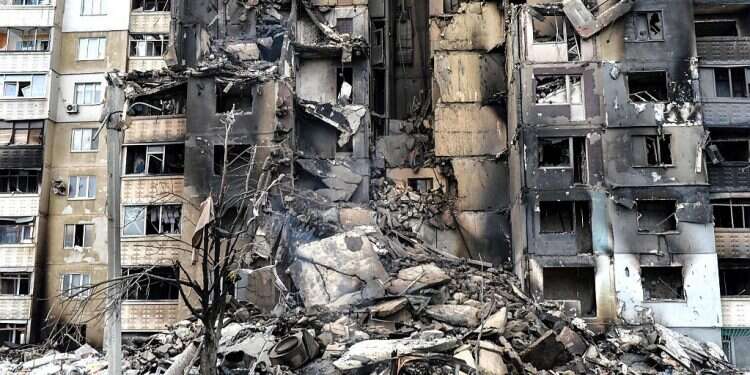Over 100 Jews seeking refuge in the Great Synagogue of Kharkiv, Ukraine, on Thursday nearly escaped tragedy when a Russian bomb exploded in a nearby shopping mall, shattering the synagogue's windows, Israel Hayom has learned.
Follow Israel Hayom on Facebook, Twitter, and Instagram
"We worry for the lies of the Jewish who moved to the basement of the synagogue, most of whom are elderly and cannot leave," the city's Chief Rabbi Moshe Moskovitz said. "We are running out of food and medicine and try to resupply despite the danger on the roads … and try to get as many Jews out of the city as possible with the help of Chabad and the Federation of Jewish Communities of Ukraine."
Rabbi Meir Stambler, who heads the federation said that "30,000 Jews have so far been rescued from Kharkiv, Kyiv and other cities in easter and northern Ukraine."
As the war ground on, the foreign ministries of Ukraine and Russia met for talks on Thursday on the sidelines of a diplomatic summit in Turkey.

An official photograph showed Russia's Sergey Lavrov flanked by two advisers sitting across from his Ukrainian counterpart Dmytro Kuleba and his officials.
Turkish Foreign Minister Mevlut Cavusoglu sat at the head of a U-shaped table in a wood-paneled hotel conference room near the Mediterranean city of Antalya.
The talks are the first high-level negotiations between the two countries since Russia invaded Ukraine two weeks ago. Cavusoglu has said the aim of the meeting is to pave the way for a meeting between the Russian and Ukrainian presidents that would be facilitated by Turkey's president.
NATO member Turkey, which has cultivated close ties with both Russia and Ukraine, is trying to balance relations with both nations. It has positioned itself as a neutral party, seeking to facilitate negotiations between the warring sides.
Also on Thursday, Ukraine banned the export of wheat, oats, and other staples that are crucial for global food supplies as authorities tried to ensure they can feed people during Russia's intensifying war.
New rules on agricultural exports introduced this week also prohibit the export of millet, buckwheat, sugar, live cattle, and meat and other "byproducts" from cattle, according to a government announcement.
The export ban is needed to prevent a "humanitarian crisis in Ukraine," stabilize the market and "meet the needs of the population in critical food products," Roman Leshchenko, Ukraine's minister of agrarian and food policy, said in a statement posted on the government website and his Facebook page.
It's the latest sign that Russia's invasion of Ukraine threatens the food supply and livelihoods of people in Europe, Africa and Asia who rely on the farmlands of the Black Sea region – known as the "breadbasket of the world."
Russia and Ukraine together supply nearly a third of the world's wheat and barley exports, which have soared in price since the invasion.
The products they send are made into bread, noodles and animal feed around the world, and any shortages could create food insecurity in places like Egypt and Lebanon.
The export ban will likely reduce global food supplies just when prices are at their highest level since 2011.
Meanwhile, sanctions on Russia continued to mount. German fashion brand Hugo Boss and US hotel chain Hilton are the latest brands to pause their Russian businesses over the incursion.
Hugo Boss said on Thursday that it has temporarily closed its stores and suspended its own retail and e-commerce business activities in Russia. The company said it will give all affected employees "financial and operational support."
Russia, along with Ukraine, accounted for about 3% of Hugo Boss's total sales last year.
The Hilton hotel chain said it's closing its corporate office in Moscow and suspending new hotel development in Russia. Russian workers will continue to be paid, the company said.
Hilton's 26 hotels in Russia remain open. They are owned and operated by franchisees, but Hilton said it is donating any profits from those hotels to relief efforts in Ukraine. Hilton said it has also donated up to 1 million room nights to support Ukrainian refugees.
Britain imposed a travel ban and asset freezes on seven more wealthy Russians, including Roman Abramovich, the billionaire owner of Premier League soccer club Chelsea.
The government said that Abramovich was banned from visiting Britain and barred from transactions with British individuals and businesses.
Abramovich said last week he was trying to sell Chelsea as the threat of sanctions loomed.
Also added to Britain's sanctions list are industrialist Oleg Deripaska and Rosneft chief executive Igor Sechin.
Europe too faces a tough choice of whether choking off oil and gas money to Russia would be worth a recession.
While US and British bans on Russian oil increase the pressure on Europe to follow suit, the continent's dependence on Russia for energy makes an immediate embargo much more difficult. Still, some officials say it is the only way to stop pouring billions in oil and gas revenue into President Vladimir Putin's coffers, despite the near-certainty of record inflation worsening.
Europe gets around 40% of its natural gas and 25% of its oil from Russia, whereas the US gets meager amounts of oil and no natural gas. A European Union boycott would mean higher prices at the pump and on utility bills, and ultimately the threat of an energy crisis and recession while the economy is still recovering from the coronavirus pandemic.
Prices for everything from food to electricity are already painfully high partly because of skyrocketing natural gas prices in Europe. Governments have rolled out subsidies to compensate people for high utility bills, while gasoline has risen above 2.01 euros per liter – the equivalent of $8.33 per gallon, meaning filling up a compact car could cost 90 euros ($98).
Those costs already are cutting into consumer spending, with inflation at an all-time high of 5.8%. The question is: How much more pain can Europeans take to try to stop Putin's attack on Ukraine?
"The consequences to the European economy would be major," Simone Tagliapietra, an energy policy expert at the Bruegel think tank in Brussels, said. "And therefore, there would need to be an upfront, clear, political decision that we are willing to compromise our economy, we are willing to afford a recession, in order to hit Putin where it hurts."
US President Joe Biden acknowledged as much when he announced the US ban on Russian oil imports, saying "many of our European allies and partners will not be able to join us."
Efforts to agree on a boycott could be complicated because some EU member countries are much more dependent than others on Russia. Germany and Italy rely heavily on Russian natural gas. Poland gets 67% of its oil from Russia, while Ireland gets only 5%.
"It will be divisive within Europe because one part of Europe risks suffering more," David Elmes, head of the Global Energy Research Group at the University of Warwick's business school, said. "So it's going to put the European political system and the European agreements and the European project ... under an awful lot of stress."
The European Commission, the EU's executive arm, announced a plan Tuesday to wean the bloc off two-thirds of Russian natural gas by the end of the year, including by purchasing more liquefied natural gas brought by ship and building up renewables more quickly.
That already will be a massive challenge to accomplish, Netherlands Prime Minister Mark Rutte said, because "we are very much dependent, that's the sad reality."
The EU goal "is a huge task to get there. I'm not sure we can get that, but we have to do everything in our power to make that happen," he said Wednesday.
With the world already facing an energy crunch and oil prices soaring to $120 per barrel – compared with $76 at the end of last year – a European boycott would send prices and inflation "to the moon," said Tagliapietra from the Bruegel think tank. And not just for Europe, but energy-consuming countries around the world.
"The price effect is what needs to be considered here, because that is what could drag the global economy into recession," he said.
Yet the intensification of the conflict, the stream of refugees and the heart-rending images of suffering are keeping the issue very much on the table.
There is "considerable pressure both from allies as well as domestically – the public would probably back this sort of a move as long as it didn't mean too high prices," Caroline Bain, chief commodities economist at Capital Economics said in an online briefing Tuesday.
Bain expected European countries to take a "more measured approach" rather than a complete ban on Russian energy and "look at ways in which they can considerably reduce their reliance on Russian energy."
Oil, which mostly comes by tanker, would be easier to replace with other suppliers than natural gas, which mostly comes by fixed pipeline from Russia.
European refineries that turn crude into gasoline are set up for denser Russian oil and would face challenges switching to other kinds of oil. Russia supplies 14% of Europe's diesel fuel used for trucks and many cars, according to analysts at S&P Global Platts, meaning disruption would "significantly tighten the market."
Europe has made it through most of the heating season, but would face a severe challenge in refilling its natural gas reserves in time for next winter.
The continent could replace all but 10% to 15% of Russian gas, requiring forced rationing that would hit industrial users first, energy analysts at Bruegel say.
Subscribe to Israel Hayom's daily newsletter and never miss our top stories!
Despite the potential fallout, the debate on a ban is ongoing. Germany's economy minister, Robert Habeck, defended on Tuesday the decision to exempt Russian energy from sanctions and noted that US officials said they would "neither demand nor ask" Europe's largest economy to join an oil embargo.
But some German lawmakers support it.
Boycotting Russian energy would be "a hard decision, but a possible and therefore necessary one" that would "hit the decisive lifeline of the Putin regime," said Norbert Roettgen, a member of the German parliament's foreign relations committee for the opposition Christian Democrat conservatives.
Dominik Tarczynski, a member of the European parliament for the populist Law and Justice Party of Poland, put it this way: "The ban on Netflix is a joke because people are dying, so we need a ban on Russian oil and gas now."




